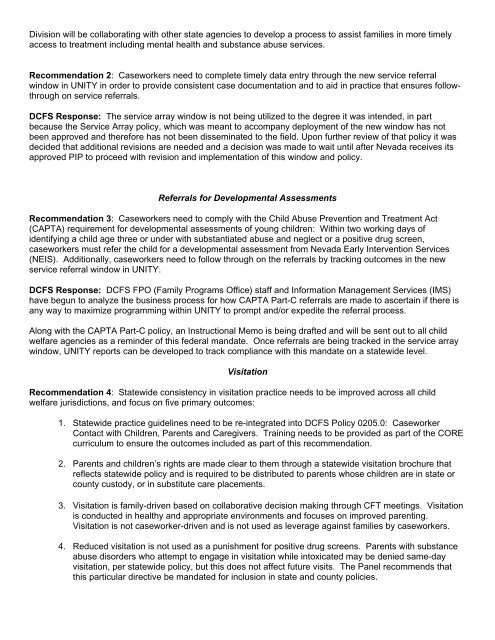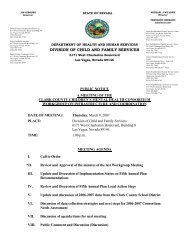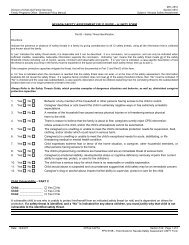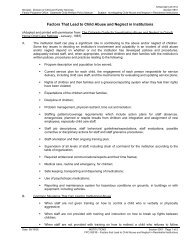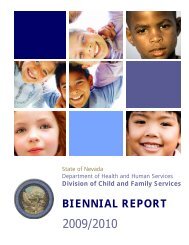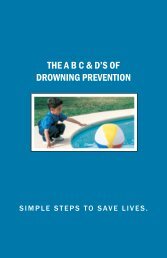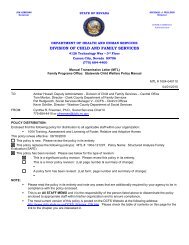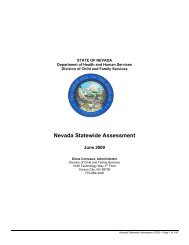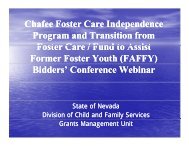STATE OF NEVADA - Division of Child and Family Services
STATE OF NEVADA - Division of Child and Family Services
STATE OF NEVADA - Division of Child and Family Services
You also want an ePaper? Increase the reach of your titles
YUMPU automatically turns print PDFs into web optimized ePapers that Google loves.
<strong>Division</strong> will be collaborating with other state agencies to develop a process to assist families in more timely<br />
access to treatment including mental health <strong>and</strong> substance abuse services.<br />
Recommendation 2: Caseworkers need to complete timely data entry through the new service referral<br />
window in UNITY in order to provide consistent case documentation <strong>and</strong> to aid in practice that ensures followthrough<br />
on service referrals.<br />
DCFS Response: The service array window is not being utilized to the degree it was intended, in part<br />
because the Service Array policy, which was meant to accompany deployment <strong>of</strong> the new window has not<br />
been approved <strong>and</strong> therefore has not been disseminated to the field. Upon further review <strong>of</strong> that policy it was<br />
decided that additional revisions are needed <strong>and</strong> a decision was made to wait until after Nevada receives its<br />
approved PIP to proceed with revision <strong>and</strong> implementation <strong>of</strong> this window <strong>and</strong> policy.<br />
Referrals for Developmental Assessments<br />
Recommendation 3: Caseworkers need to comply with the <strong>Child</strong> Abuse Prevention <strong>and</strong> Treatment Act<br />
(CAPTA) requirement for developmental assessments <strong>of</strong> young children: Within two working days <strong>of</strong><br />
identifying a child age three or under with substantiated abuse <strong>and</strong> neglect or a positive drug screen,<br />
caseworkers must refer the child for a developmental assessment from Nevada Early Intervention <strong>Services</strong><br />
(NEIS). Additionally, caseworkers need to follow through on the referrals by tracking outcomes in the new<br />
service referral window in UNITY.<br />
DCFS Response: DCFS FPO (<strong>Family</strong> Programs Office) staff <strong>and</strong> Information Management <strong>Services</strong> (IMS)<br />
have begun to analyze the business process for how CAPTA Part-C referrals are made to ascertain if there is<br />
any way to maximize programming within UNITY to prompt <strong>and</strong>/or expedite the referral process.<br />
Along with the CAPTA Part-C policy, an Instructional Memo is being drafted <strong>and</strong> will be sent out to all child<br />
welfare agencies as a reminder <strong>of</strong> this federal m<strong>and</strong>ate. Once referrals are being tracked in the service array<br />
window, UNITY reports can be developed to track compliance with this m<strong>and</strong>ate on a statewide level.<br />
Visitation<br />
Recommendation 4: Statewide consistency in visitation practice needs to be improved across all child<br />
welfare jurisdictions, <strong>and</strong> focus on five primary outcomes:<br />
1. Statewide practice guidelines need to be re-integrated into DCFS Policy 0205.0: Caseworker<br />
Contact with <strong>Child</strong>ren, Parents <strong>and</strong> Caregivers. Training needs to be provided as part <strong>of</strong> the CORE<br />
curriculum to ensure the outcomes included as part <strong>of</strong> this recommendation.<br />
2. Parents <strong>and</strong> children’s rights are made clear to them through a statewide visitation brochure that<br />
reflects statewide policy <strong>and</strong> is required to be distributed to parents whose children are in state or<br />
county custody, or in substitute care placements.<br />
3. Visitation is family-driven based on collaborative decision making through CFT meetings. Visitation<br />
is conducted in healthy <strong>and</strong> appropriate environments <strong>and</strong> focuses on improved parenting.<br />
Visitation is not caseworker-driven <strong>and</strong> is not used as leverage against families by caseworkers.<br />
4. Reduced visitation is not used as a punishment for positive drug screens. Parents with substance<br />
abuse disorders who attempt to engage in visitation while intoxicated may be denied same-day<br />
visitation, per statewide policy, but this does not affect future visits. The Panel recommends that<br />
this particular directive be m<strong>and</strong>ated for inclusion in state <strong>and</strong> county policies.


